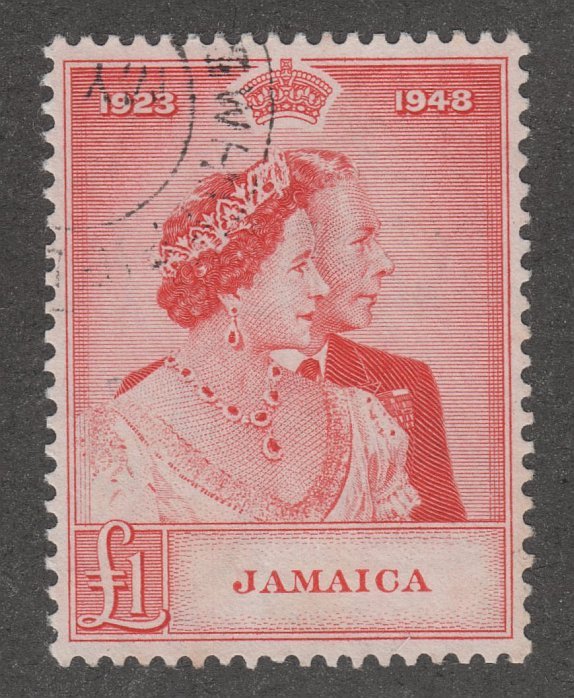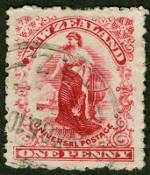
Discussion - Member to Member Sales - Research Center

Discussion - Member to Member Sales - Research Center

I have about three or four of these cancels from various cities and would find it interesting to know in how many cities this type of cancel has been used, maybe also for how long.
I currently cannot post a picture, but should be able to do so over the weekend, that is, if nobody is able to help out in the mean time based on the description.

Login to Like
this post
Here's an image of a Victory cancel, on a Second World War postal card. They are easy to find, although nice strikes present more of a challenge.

These cancellations were also used with so-called "Blackout Cancellations," which hid the city of origin as a security measure. My stamp club owns a book listing Canadian slogan cancels; I'll try to remember to check it at tomorrow night's meeting.
Bob

Login to Like
this post
Hi Bob,
That was unbelievably quick. I am shocked. Wow. The cancellation originates probably from a "Universal" cancellation machine. As far as I know, a lot of collector interest in Canada focuses on the earlier "International" machines. But let's see what that reference turns up. A listing of cities that had this type of cancel would be great, maybe even rarity factors? Well let's not get my hopes up . . .
I find these cancels quite intriguing and over time collecting one from each of the cities that had such cancels could be fun (and would certainly be extremely challenging).
As far as blackout cancels go: I have never seen one of these and I sure find this a very interesting piece of information.
I do own, by the way, a reference book on U.S. machine slogan cancellations up to 1940, so I could reciprocate with like information 
Arno

Login to Like
this post
Another shock . . . my keystroke composed smilie just turned into a real one . . .
I never knew that the message board software would do this . . .
I guess I have to try a couple more:
;) 



Edit: Cool.
(Message edited by rhinelander on January 22, 2008)

Login to Like
this post
That emoticon feature is new, I think. Anyway, here are three blackout cancels in my collection:



As you can see, they were used both with slogan cancels and "wavy-line" duplex cancels. As I recall, there were two types of machines that were used, and several dies.
Bob

Login to Like
this post
Thank you for showing these examples of Blackout cancels. Yet something else for me to watch out for. How rare do you think are these cancels?
Are these cancels on military (soldiers') mail? I couldn't think of a convincing reason otherwise to eliminate the city name from the dial. The sender's address on the cover gives the location away anyway, one would think . . .

Login to Like
this post
Especially for Arno (from Slogan Postmarks of Canada -- Catalogue and Guidebook, Coutts, 2nd edition (2002):

This should answer some basic questions.
Bob

Login to Like
this post
About blackout cancels: The theory (apparently) was that troop and ship movements would increase the amount of mail posted in port cities. Enemy agents would notice this (!) and surmise said troop movements. It seems quite silly now: Much of the mail so postmarked (it's not very rare) is commercial mail with "cornercard" return addresses.
I have a couple of British wartime covers with what appear to be makeshift blackout cancels: they were postmarked normally, but someone carefully scratched out the placenames.
Bob

Login to Like
this post
Thank you very much, Bob. This answers all my questions. I have copies of these cancels from Charlottetown, Halifax, Hamilton, and Montreal. The scan got a little dark and I had to resize multiple times to get it to specs, but here they are:

This Canadian slogan cancel book looks like a grat reference and I think I will put it on my watchlist. Too bad that good reference works are often quite expensive and, thinking about it and looking back in time, on average I think I have been spending more money on literature and supplies than on stamps.

Login to Like
this post
Especially for Arno (but an open invitation to anyone, of course): I have just been doing some editing on one of my web pages, about my Uncle Phil's experiences in the Pacific during the Second World War. I have designed a new logo for it, which incorporates the Morse Code for "V" (for Victory); the web page also includes a V-Mail letter that my uncle sent to my paternal grandparents, as well as an explanation of V-Mail. The name of the web page is The War Stories of M/Sgt Philip Ingraham.
Bob
(Message edited by Bobstamp on January 26, 2008)

Login to Like
this post
10:55:14pm
I am looking for any information on a particular type of machine cancel used in several Canadian cities for some time during WWII. These cancels are machine slogan cancels with a regular circular postmark containing city, province, and date on the left hand side and the letter "V" in Morse code, i.e., ". . . -", in a rectangular box on the right hand side.
I have about three or four of these cancels from various cities and would find it interesting to know in how many cities this type of cancel has been used, maybe also for how long.
I currently cannot post a picture, but should be able to do so over the weekend, that is, if nobody is able to help out in the mean time based on the description.

Login to Like
this post
11:09:36pm
re: Canada WWII era Victory ". . . -" machine cancels
Here's an image of a Victory cancel, on a Second World War postal card. They are easy to find, although nice strikes present more of a challenge.

These cancellations were also used with so-called "Blackout Cancellations," which hid the city of origin as a security measure. My stamp club owns a book listing Canadian slogan cancels; I'll try to remember to check it at tomorrow night's meeting.
Bob

Login to Like
this post
11:44:48pm
re: Canada WWII era Victory ". . . -" machine cancels
Hi Bob,
That was unbelievably quick. I am shocked. Wow. The cancellation originates probably from a "Universal" cancellation machine. As far as I know, a lot of collector interest in Canada focuses on the earlier "International" machines. But let's see what that reference turns up. A listing of cities that had this type of cancel would be great, maybe even rarity factors? Well let's not get my hopes up . . .
I find these cancels quite intriguing and over time collecting one from each of the cities that had such cancels could be fun (and would certainly be extremely challenging).
As far as blackout cancels go: I have never seen one of these and I sure find this a very interesting piece of information.
I do own, by the way, a reference book on U.S. machine slogan cancellations up to 1940, so I could reciprocate with like information 
Arno

Login to Like
this post
11:48:26pm
re: Canada WWII era Victory ". . . -" machine cancels
Another shock . . . my keystroke composed smilie just turned into a real one . . .
I never knew that the message board software would do this . . .
I guess I have to try a couple more:
;) 



Edit: Cool.
(Message edited by rhinelander on January 22, 2008)

Login to Like
this post
01:18:05am
re: Canada WWII era Victory ". . . -" machine cancels
That emoticon feature is new, I think. Anyway, here are three blackout cancels in my collection:



As you can see, they were used both with slogan cancels and "wavy-line" duplex cancels. As I recall, there were two types of machines that were used, and several dies.
Bob

Login to Like
this post
09:52:06am
re: Canada WWII era Victory ". . . -" machine cancels
Thank you for showing these examples of Blackout cancels. Yet something else for me to watch out for. How rare do you think are these cancels?
Are these cancels on military (soldiers') mail? I couldn't think of a convincing reason otherwise to eliminate the city name from the dial. The sender's address on the cover gives the location away anyway, one would think . . .

Login to Like
this post
12:37:26am
re: Canada WWII era Victory ". . . -" machine cancels
Especially for Arno (from Slogan Postmarks of Canada -- Catalogue and Guidebook, Coutts, 2nd edition (2002):

This should answer some basic questions.
Bob

Login to Like
this post
12:50:11am
re: Canada WWII era Victory ". . . -" machine cancels
About blackout cancels: The theory (apparently) was that troop and ship movements would increase the amount of mail posted in port cities. Enemy agents would notice this (!) and surmise said troop movements. It seems quite silly now: Much of the mail so postmarked (it's not very rare) is commercial mail with "cornercard" return addresses.
I have a couple of British wartime covers with what appear to be makeshift blackout cancels: they were postmarked normally, but someone carefully scratched out the placenames.
Bob

Login to Like
this post
11:21:50am
re: Canada WWII era Victory ". . . -" machine cancels
Thank you very much, Bob. This answers all my questions. I have copies of these cancels from Charlottetown, Halifax, Hamilton, and Montreal. The scan got a little dark and I had to resize multiple times to get it to specs, but here they are:

This Canadian slogan cancel book looks like a grat reference and I think I will put it on my watchlist. Too bad that good reference works are often quite expensive and, thinking about it and looking back in time, on average I think I have been spending more money on literature and supplies than on stamps.

Login to Like
this post
11:31:30pm
re: Canada WWII era Victory ". . . -" machine cancels
Especially for Arno (but an open invitation to anyone, of course): I have just been doing some editing on one of my web pages, about my Uncle Phil's experiences in the Pacific during the Second World War. I have designed a new logo for it, which incorporates the Morse Code for "V" (for Victory); the web page also includes a V-Mail letter that my uncle sent to my paternal grandparents, as well as an explanation of V-Mail. The name of the web page is The War Stories of M/Sgt Philip Ingraham.
Bob
(Message edited by Bobstamp on January 26, 2008)

Login to Like
this post

